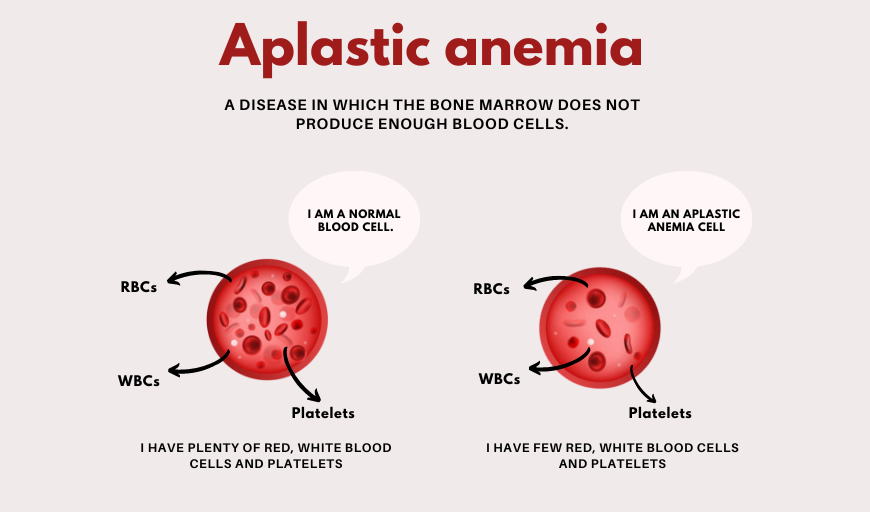
Aplastic anemia is a rare and potentially serious blood disorder that affects people of all ages, including children. This condition occurs when the bone marrow fails to produce an adequate amount of blood cells, including red blood cells, white blood cells, and platelets. Aplastic anemia can lead to various complications due to the decreased production of these vital blood components, and prompt diagnosis and treatment are essential for managing the condition effectively. Dr. Vikas Dua is one of the best Aplastic Anemia Doctors in India providing the best Aplastic Anemia Treatment in Delhi.
Understanding Aplastic Anemia in Children:
Aplastic anemia is particularly concerning when it affects children, as it can interfere with their growth and development. The bone marrow, which is responsible for producing blood cells, fails to function properly in aplastic anemia. In children, this disorder can be especially alarming since their bodies are still in the process of growing and maturing.
Symptoms and Causes:
The symptoms of aplastic anemia in children can vary widely, ranging from mild to severe. Some common symptoms include:
- Fatigue: Children with aplastic anemia often experience fatigue and weakness due to the decreased number of red blood cells, which are responsible for carrying oxygen to various parts of the body.
- Frequent Infections: Aplastic anemia can lead to a weakened immune system, making children more susceptible to infections. They may experience frequent illnesses or have difficulty recovering from infections.
- Easy Bruising and Bleeding: Low platelet counts can result in easy bruising and prolonged bleeding from minor cuts or injuries.
- Pale Skin: Anemia can cause the skin to appear pale or jaundiced (yellowish) due to the reduced number of red blood cells.
- Shortness of Breath: Children with aplastic anemia may experience shortness of breath, even with minimal physical activity, due to the lack of oxygen-carrying red blood cells.
The exact cause of aplastic anemia is not always clear, but it can be attributed to a variety of factors, including autoimmune disorders, certain medications, exposure to toxins, and viral infections. In some cases, aplastic anemia is inherited, but most cases are considered acquired.
The Role of Dr. Vikas Dua:
In the realm of aplastic anemia treatment, Dr. Vikas Dua stands out as a leading expert in Delhi. With a wealth of experience and a stellar reputation, Dr. Vikas Dua has become a beacon of hope for patients and their families dealing with aplastic anemia, particularly in the pediatric population.
Dr. Vikas Dua’s expertise extends beyond his medical qualifications; his compassionate approach to patient care and his dedication to staying at the forefront of medical advancements make him an exceptional choice for managing aplastic anemia in children.
Aplastic Anemia Treatment Options:
The treatment approach for aplastic anemia depends on several factors, including the severity of the condition, the child’s age, overall health, and the underlying cause. Dr. Vikas Dua employs a multidisciplinary approach to treatment, considering various therapeutic options such as:
- Blood Transfusions: Transfusions of red blood cells and platelets can help alleviate symptoms and improve overall well-being. However, these transfusions are not a definitive cure and must be carefully managed.
- Bone Marrow/Stem Cell Transplantation: For severe cases of aplastic anemia, a bone marrow or stem cell transplant may be necessary. This procedure involves replacing the faulty bone marrow with healthy marrow or stem cells from a donor.
- Immunosuppressive Therapy: In some cases, the immune system may be attacking the bone marrow, leading to aplastic anemia. Immunosuppressive medications can help suppress this immune response and allow the bone marrow to recover.
- Supportive Care: Alongside specific treatments, managing aplastic anemia often involves supportive care measures, such as antibiotics to prevent infections, medications to stimulate blood cell production, and close monitoring of blood counts.
The Path to Hope and Healing:
Facing a diagnosis of aplastic anemia in a child can be daunting, but with the right medical guidance and a supportive healthcare team, families can find a path to hope and healing. Dr. Vikas Dua’s personalized and holistic approach to treatment not only addresses the physical aspects of the condition but also considers the emotional and psychological well-being of both the child and their family.
In Delhi, Dr. Vikas Dua has emerged as a beacon of expertise and compassion in the field of aplastic anemia treatment. His commitment to advancing medical knowledge, combined with his unwavering dedication to his patients, positions him as a top choice for families seeking the best possible care for their children.
In conclusion, aplastic anemia is a rare but potentially serious blood disorder that can significantly impact a child’s health and well-being. Prompt diagnosis and appropriate treatment are crucial for managing the condition effectively. Dr. Vikas Dua’s expertise in treating aplastic anemia in children shines brightly in the medical landscape of Delhi. His comprehensive and compassionate approach to patient care makes him a trusted partner in the journey towards better health for children with aplastic anemia. Families facing this challenging diagnosis can find solace in the hands of a skilled and caring physician like Dr. Vikas Dua, who offers hope, healing, and a brighter future for every child under his care.

